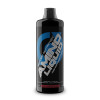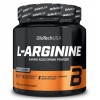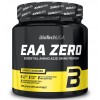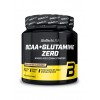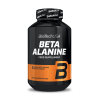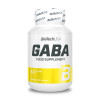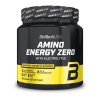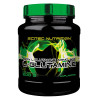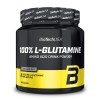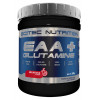
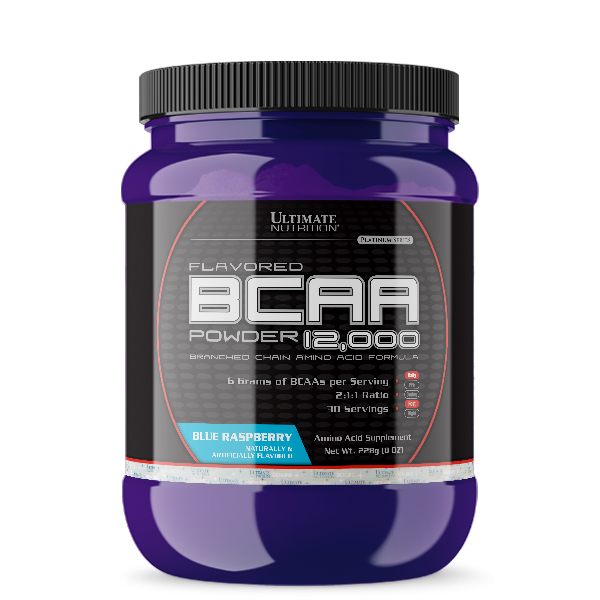


- 6g of BCAAs per serving
- Optimal and researched 2:1:1 ratio
- 3g L-leucine / 1.5g L-isoleucine / 1.5g L-valine

Security policy

Delivery policy

Return policy
It has long been established that protein is an essential nutrient that needs to be obtained fromour diets. The ultimate value of a protein source is its amino acid composition. Basically, a protein molecule is a long chain of amino acids linked by peptide bonds (i.e., an amino acid linked to another amino acid). Hundreds of different amino acids exist in nature; however, only twenty-two are typically found as components in human peptides or proteins. These amino acids are joined in varying combinations, each having a distinct amino-acid sequence which determines its specific shape and function. Once digested andabsorbed, these amino acids play central roles as building blocks of proteins and as intermediates in metabolism, thereby controlling virtually all cellular process and reactions in living cells. Scientists, experts, and medical professionals all agree that getting enough amino acids in one's diet is an important factor in maintaining proper nutrition. In recent years, especially in the fitness industry, the emphasis has shifted from using protein to consuming specific amino acids.1,2,3Many physiological processes related to bodybuilding, from energy, recovery, muscle hypertrophy, to strength gains, are linked to amino acids.Twenty-two amino acids have been identified that are naturally incorporated into polypeptides (i.e., long chain of amino acids) andare called proteinogenic (used in the production of protein). Of the twenty-two amino acids, eight are labelled “essential” amino acids because the human body cannot synthesize them from other compounds, so they must be obtained from our diet. The remaining fourteen amino acids are “non-essential” because they can be made in the body. The term non-essential can be misleading since several amino acids are actually semi-essential in children because the metabolic pathways that synthesize these amino acids are not fully developed.5,6Even more confusing is the fact that some amino acids become conditionally essential, meaning they are not normally required in the diet but must be supplied exogenously to specific populations that do not synthesize them in adequate amounts. The amounts required also depend on the age and health of the individual, so it is hard to make general statements about the dietary requirement for some amino acids.7,8This is why you will see some variation in the number of essential and non-essential amino acids printed in articles. Failure to obtain enough of even one of the essential amino acids results in degradation of the body's proteins (e.g., muscle tissue).The branched chain amino acids leucine, isoleucine, and valineare classified among the essential amino acids. They are very important for active individuals, bodybuilders, and professional athletes since they influence various aspects of muscle metabolism.The “branched chain” designation refers to their unique chemical structure. The combination of these three BCAAs makes up approximately 1/3 of skeletal muscle in the human body.9The body requires higher amounts of BCAAs during and following exercise as they are taken up directly by the skeletal muscles versus other amino acids that are first metabolized through the liver. BCAAs are unique in that they can be used to either build new proteins or be burned as fuel to produce energy.10The largest amounts ofBCAAs can be found in dairy (e.g., milk, whey, and casein), red meat, and eggs. Although they are present in all foods containing protein, supplementing your diet with additional BCAAs provides a definite advantage.
Privileged & ConfidentialPage 2of 4These statements have not been evaluated by the Food and Drug AdministrationThe human body requires a steady supply of amino acids since there is a constant flux of protein turnover, especially surrounding exercise. During exercise, increased oxidation of the BCAAs is generally recognized as the signal to the body to stop protein synthesis in the muscles.2The body uses the BCAAs during exercise to maintain energy and make glucose. After an acute bout of resistance exercise, oxidation continues. Although protein synthesis in skeletal muscle is elevated after exercise, so is protein degradation. In the absence of nutrition, the body will remain in negative nitrogen balance, meaning catabolism (i.e., protein break down) exceeds anabolism (i.e., protein synthesis). Consuming BCAAs before or after exercise can reduce protein breakdown, increase protein synthesis, and stimulate the release of insulin.11-14Insulin is an anabolic hormone usually associated with building various energy molecules in the body (e.g., glycogen and triglycerides) and with preventing the breakdown of muscle following periods of physical stress (e.g., exercise), thereby preserving muscle mass.13,14Current research has demonstrated that BCAAs may block what is called delayed-onset muscle soreness following intense training.9Several studies suggest that BCAAs influence delayed onset muscle soreness and the markers of muscle damage associated with intense exercise (e.g., endurance and resistance exercise). Less muscle damage and less soreness mean faster recovery and a quicker return to training. BCAAs have also been shown to have a positive effect on mood and mental function in endurance athletes. Although limited, research supports the idea that the BCAAs can decrease serotonin in the brain (serotonin can cause a sense of tiredness), thereby lowering mental fatigue and maintaining mental acuteness during prolonged endurance exercise.15,16Low levels of the BCAAs also contribute to fatigue and should be replaced following exercise or participation in a competitive event. Research has revealed that the BCAAs help to prevent fatigue and maintain muscle mass and strength during times of physical stress such as intense workouts.1Leucine has recently been shown to have its own anabolic (i.e., muscle-building) abilities by influencing various signalling cascades and chemical signals that activate protein synthesis.10Through phosphyorylaton of mammalian target of rapamycin (mTor ), a key regulator of cell growth and protein synthesis, leucine, along with the other two BCAAs, transforms the body into a muscle-building machine.17,18In simple terms, the body is switched into an anabolic state using available amino acids to build hard, dense muscle. To obtain the greatest benefit from BCAA supplements, you must ensure that you get enough protein from your diet to support an increased ability to grow. Bodybuilders, athletes, weekend warriorswho weight train regularly, and endurance athletes who regularly compete in aerobic events such as running, cycling, or swimming will benefit from BCAA supplementation. Supplementation of BCAAs will help meet the increased demand the body requires under times of stress. Numerous studies have shown that BCAAs can enhance energy levels, build muscle, and speed recovery under a variety of metabolic conditions. Aside from playing an important role in protein synthesis, the BCAAs provide extra energy during heavy lifting, help spare muscle tissue, and fight mental brain drain as you battle through a workout. BCAAs can be taken at anytime during the day, preferably on an empty stomach to avoid competition for absorption with other amino acids; however, the most beneficial times to take the BCAAs are directly before or just after training. Currently, it is difficult to provide an exact dose of BCAAs per kg body weight that influences muscle growth and prevents breakdown. These statements have not been evaluated by the Food and Drug AdministrationFAQsQ:
What is the amount and ratio of BCAAs found in Flavored BCAA 12,000 Powder?A:Flavored BCAA 12,000 Powderoffer 6000mg of BCAAs in a 2:1:1 ratio of leucine (3000 mg), isoleucine (1500mg) and valine (1500mg) per serving.
Q: How do I take Flavored BCAA 12,000 Powder?A:Mix one scoop (7.6 grams) with 6-8 ounces of water or your favorite cold beverage. For optimal use, take between meals and immediately after your workout. For serious bodybuilders we recommend mixing two scoops.
You might also like
10 other products in the same category:
